The bob A of a pendulum released from horizontal to the vertical hits another bob B of the same mass at rest on a table as shown in the figure. If the length of the pendulum is 1m, calculate the height to which bob A will rise after collision.
 Solution in Punjabi
Solution in Punjabi
Step by step video & image solution for The bob A of a pendulum released from horizontal to the vertical hits another bob B of the same mass at rest on a table as shown in the figure. If the length of the pendulum is 1m, calculate the height to which bob A will rise after collision. by Physics experts to help you in doubts & scoring excellent marks in Class 11 exams.
Updated on:21/07/2023Topper's Solved these Questions
Similar Questions
What is SI unit of work?
View SolutionWhich state of matter has the greatest and least internal enrgy having the same mass and same temperature?
View SolutionThe bob A of a simple pendulum released from 30∘ to the vertical hits another bobo B of the same mass at rest on a table as shown in figure. How high does the bob A rise after the collision ? Neglect the size of the bobs and assume the collision to be elastic.
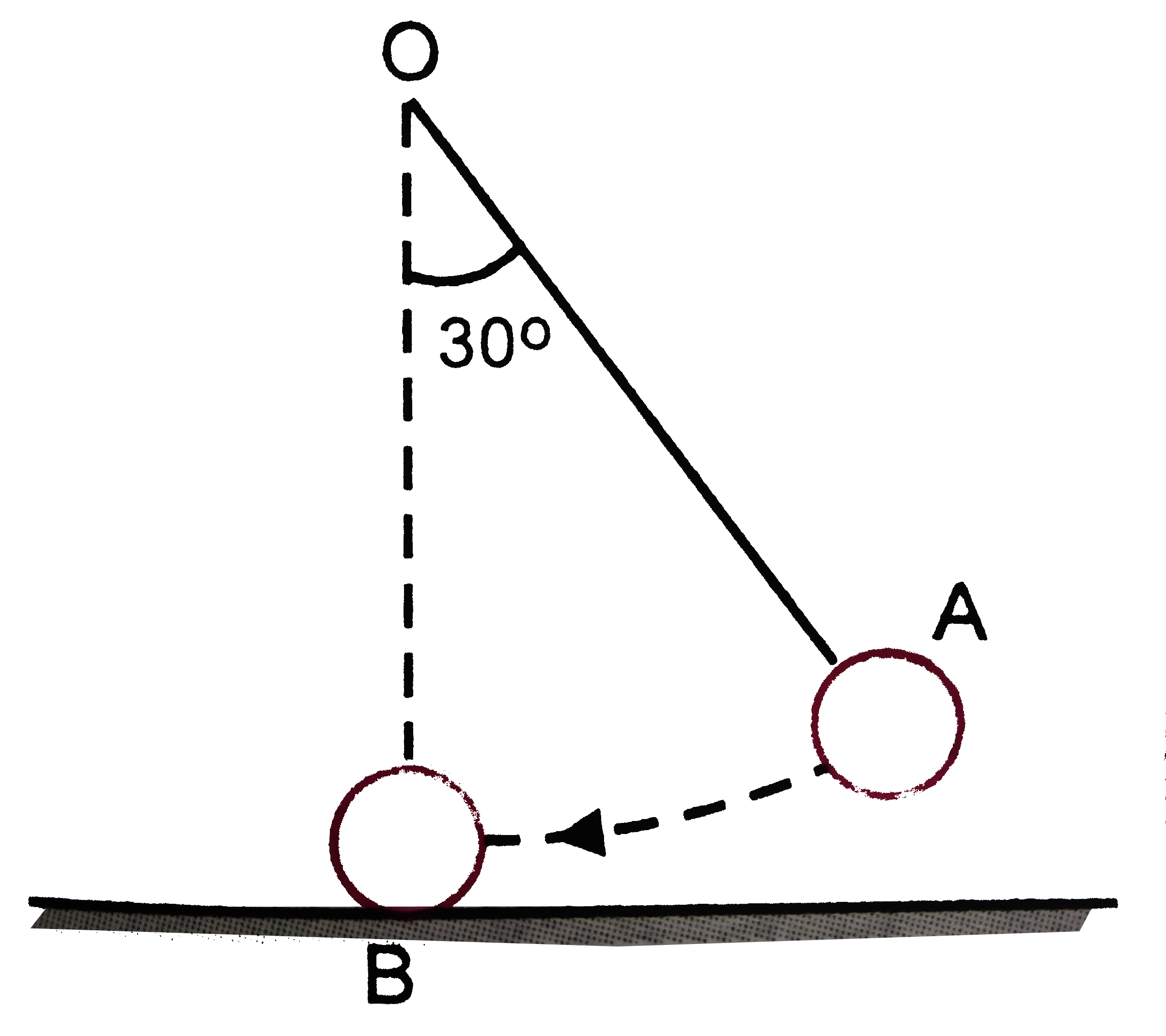
View SolutionThe bob A of a pendulum released from horizontal to the vertical hits another bob B of the same mass at rest on a table as shown in figure.
If the length of the pendulum is 1m, calculate
(a) the height to which bob A will rise after collision.
(b) the speed with which bob B starts moving.
Neglect the size of the bobs and assume the collision to be elastic.
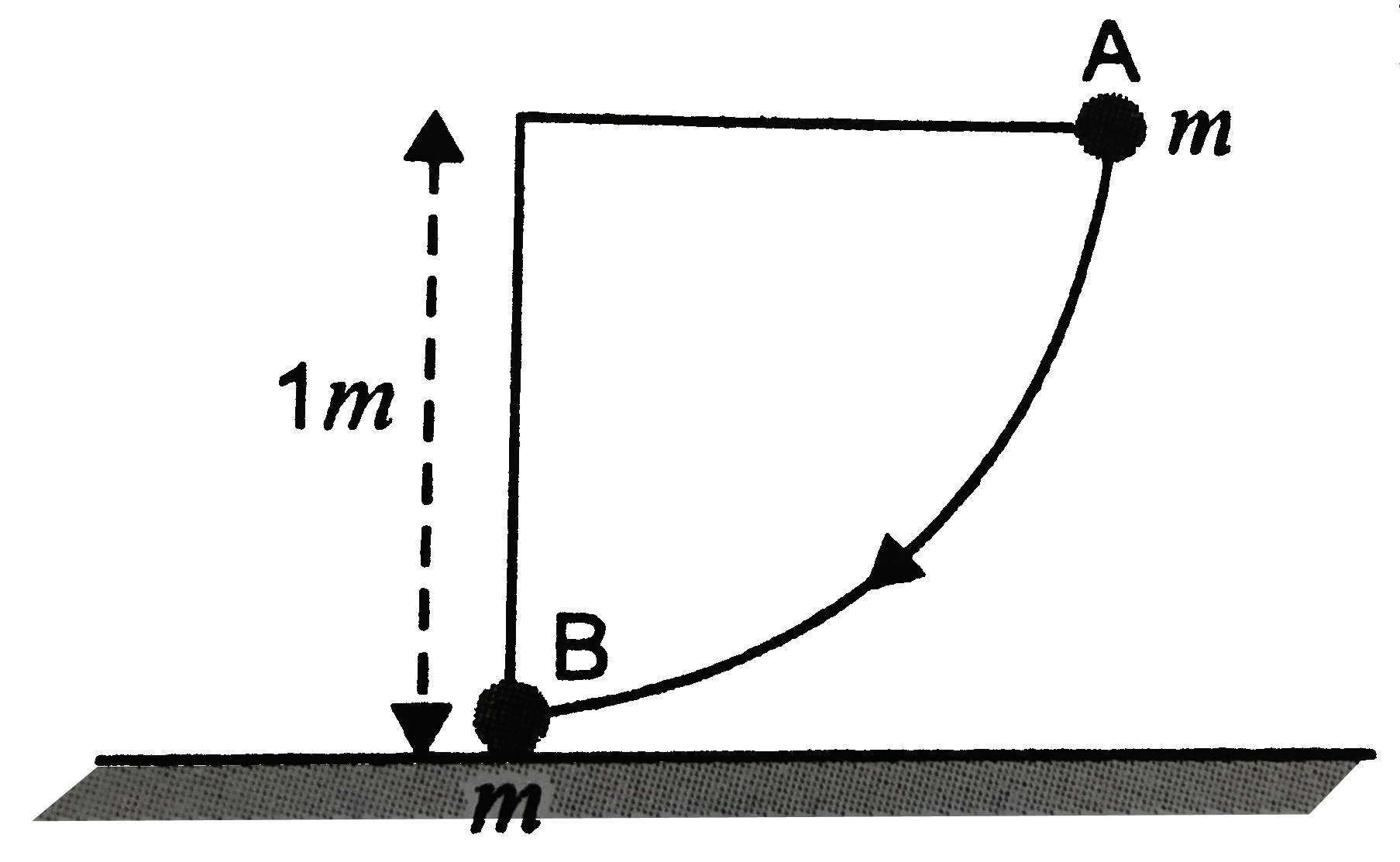
View SolutionThe bob A of a pendulum released from a height h hits head-on another bob B of the same mass of an identical pendulum initially at rest. What is the result of this collision? Assume the collisio to be elastic (see figure).
View SolutionThe bob A of a pendulum released from 30∘ to the vertical hits another bob B of the same mass at rest on a table as shown in Fig. 6.15. How high does the bob A rise after the collision ? Neglect the size of the bobs and assume the collision to be elastic.
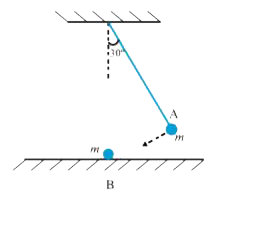
View SolutionThe bob A of a pendulum released from 30^(@) to the vertical hits another bob B of the same mass at rest on a table as shown in Fig. 6.15. How high does the bob A rise after the collision ? Neglect the size of the bobs and assume the collision to be elastic.
View SolutionThe bob A of a pendulum released from 30∘ to the vertical hits another bob B of the same mass at rest on a table as shown in Fig. 6.15. How high does the bob A rise after the collision ? Neglect the size of the bobs and assume the collision to be elastic.
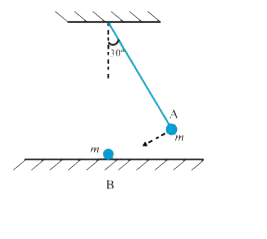
View SolutionThe bob A of a simple pendulum released from 30∘ to the vertical hits another bobo B of the same mass at rest on a table as shown in figure. How high does the bob A rise after the collision ? Neglect the size of the bobs and assume the collision to be elastic.

View SolutionThe bob A of a pendulum released from horizontal to the vertical hits another bob B of the same mass at rest on a table as shown in figure. If the length of the pendulum is 1m, calculate (a) the height to which bob A will rise after collision. (b) the speed with which bob B starts moving. Neglect the size of the bobs and assume the collision to be elastic.
View SolutionThe bob A of pendulum of length 1 m released from 30∘ to the vertical hits another bob B of same mass at rest on the table. How high does the bob A rise after the collision and find the velocity of B.
View SolutionThe bob A of a pendulum of length 1 m released from 30∘ to the vertical hits another bob B of same mass at rest on the table. How high does the bob A rise after the collision and find the velocity of B.
View SolutionThe bob A of a pendulum released from 30^(@) to the vertical hits another bob B of the same mass at rest on a table as shown in figure . How high does the bob A rise after the collision ? Neglect the size of the bobs and assume the collision to be elastic .
View SolutionThe bob A of a pendulum released from 30∘ to the vertical hits another bob B of the same mass at rest on a table as shown in figure . How high does the bob A rise after the collision ? Neglect the size of the bobs and assume the collision to be elastic .
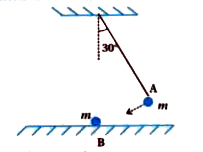
View SolutionThe bob A of a pendulum released from horizontal to the vertical hits another bob B of the same mass at rest on a table as shown in figure.
If the length of the pendulum is 1m, calculate
(a) the height to which bob A will rise after collision.
(b) the speed with which bob B starts moving.
Neglect the size of the bobs and assume the collision to be elastic.

View SolutionA pendulum bob of mass 'm' is released from horizontal position. It collides easltically at the lowest point with another pendulum of same length but with a bob of mass '2m' initially at rest. The ratio of the heights to which the bobs of the two pendulums rise after collisions is
View Solution
